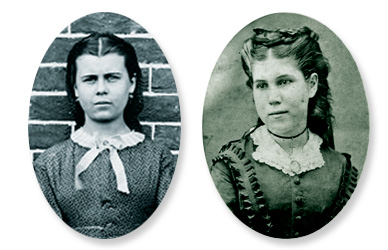Two Girls, Two Diaries

Caroline Richards and Carrie Berry were real girls who grew up in the 1860s. Each kept a diary during the Civil War.
Girls growing up at the time of the Civil War had different experiences depending upon where they lived. Most Northern girls lived far away from the actual battlegrounds of the war. For Southern girls, the war was often fought in their own backyards.
Patriotism and Support
Caroline Richards, New York
Caroline Richards lived with her grandparents and younger sister, Anna, in a small town in New York. For the most part, her daily life during the war was unchanged. She still went to school and church, attended concerts, and helped with household chores. News of the war came through reading newspapers and listening to stories told by friends and relatives.
In her diary, Caroline wrote about the importance of showing support for the Union soldiers. “A lot of us girls went down to the train and took flowers to the soldiers as they were passing through,” she wrote in May 1861. “We wear little flag pins for badges and tie our hair with red, white, and blue ribbon.”
Caroline also helped sew garments and bandages for the soldiers: “We are going to write notes and enclose them in the garments to cheer up the soldier boys.” When the war ended in 1865, she joined in the celebration: “I am going down town…with my flag in one hand and bell in the other and make all the noise I can.” For Caroline Richards, the Civil War was a time to show patriotism for her country.
Hardship and Fear
Carrie Berry, Georgia
Growing up in Atlanta, Georgia, Carrie Berry had very different wartime experiences. With her parents and sister, Carrie lived through the shelling and burning of Atlanta by General William Tecumseh Sherman’s Union troops in 1864.
For Carrie, each day brought new hardships and fears. On her birthday, she did not have a cake because of food shortages, so she “celebrated with ironing.” Two days later, she wrote: “I knit all morning. In the evening, we had to run to Auntie’s and get in the cellar. We did not feel safe in our cellar, they [the shells] fell so thick and fast!” (The Berry family had dug a hole in the ground where they hid when the fire from guns and cannon was heavy.)
As the fighting around Atlanta continued, Carrie could not go to school or anywhere else. She wrote: “There is a fire in town nearly every day. I get so tired of being housed up all the time. The shells get worse and worse every day. O that something would stop them.”
When the Confederate troops abandoned Atlanta in September 1864, Sherman ordered everyone to leave the city, and then he set fire to it. By agreeing to work for the Union army, Carrie’s father made it possible for his family to stay in Atlanta. But Carrie was not spared from the terror of a city being burned all around her.
“I could not go to sleep for fear that they would set our house on fire,” Carrie wrote on November 12, 1864. When the Union troops finally left, Carrie wrote that she was glad, because “nobody knows what we have suffered since they came in.” Unlike Caroline Richards, Carrie Berry was not sheltered from the brutalities of the war.